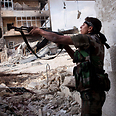
Syria: Worst is yet to come
Analysis: Increased involvement of armed jihadi groups in civil war may lead to ethnic cleansing in post-Assad Syria
Reports linked to the online portal of the "revolution coordination page of Midan area" indicate that the Russian journalist Anhar Kochneva is in the hands of jihadist elements operating in Syria. Her captors have expressed multiple times their willingness to execute her. Following her capture, Mrs. Kochneva may or may not be arbitrarily killed, yet what remains certain is that the situation which is rapidly developing in Syria leaves no room for doubt. Regardless of the mounting number of innocent deaths, the gruesome crimes committed by government forces and the fierce fighting that has been taking place between opposition groups and loyalist units, it is certain that the worse is yet to come for the Syrian people and for the neighboring countries. This assertion is conceivable as a close look at all the likely outcomes of the present crisis do not indicate any strong probability for peace and stability in the Near East.
President Barak Obama may have decided to bless the Syrian opposition with the White House recognition, while other European governments are also in the process of doing so, yet the problem regarding the nature of the multiple movements fighting regime forces is today impossible to ignore. Recent reports and articles have pointed at the growing role played in logistical coordination and combat operations by al-Qaeda-linked jihadi groups. The infamous Jabhat al-Nusra is gaining international notoriety by having been the first opposition force listed as a terrorist organization by the United States since the beginning of hostilities in 2011.
The exponential growth in the number of Jihadi elements operating inside Syria, be they of Syrian or foreign origin, cannot be left aside. Any post-Assad solution is likely to be dominated by confessional violence and discord, as fundamentalist armed groups are increasingly involved in the fight against the Syrian governmental forces.
External support creates a system of allegiance which tends to weaken the link these groups have with the local people, as they receive funding and logistical support from foreign actors. This variable in the Syrian equation may generate a situation similar to a post-2003 Iraq, where armed factions divided among sectarian lines operate an effective partition of the country. In addition to this, a serious concern for the international community should be represented by the increasingly violent tone of radical elements such as the fundamentalist preacher Ahmad Al Baghdadi Al Hassani, calling for the conversion or the extermination of Christians living in Syria.
The overall risk is that with the fall of Bashar Assad, which may come in a time-span of less than six months, well-armed and better trained groups will launch a second wave of violence against the Syrian population aimed at ethnic and confessional cleansing areas of the country.
The above mentioned situation is worsened by the fact that the regime no longer has a monopoly over human rights abuses. In the early months of the rebellion against Assad's government, it was crystal clear that atrocities were carried out by regulars of the Syrian army and irregular forces loyal to the government. Since the second half of 2012, an increasing number of reports and unconfirmed sources have been highlighting the growing human rights abuses and war crimes committed by armed groups opposed to the government. This developing new reality presents the international community with a major challenge: By supporting and possibly arming Syrian opposition forces, one runs the risk of directly or indirectly creating more harm to the Syrian populations.
These short to medium term risks are reinforced by two growing threats to regional security. The willingness stated by Kurds to gain autonomy in a post-Assad Syria is likely to cause long term friction with Arab fighting forces. Not taking into consideration the possibility of Turkish incursions into Syrian territory to limit the Kurds marge de manoeuvre, Syrian armed groups, be they secular or Islamist, will certainly wage a campaign against the Syrian Kurds' political ambitions. This could lead to long term instability.
With the growing number of unstable and hardly controllable factors involved in the Syrian crisis it is becoming clear that the hardships imposed on the Syrian population are highly unlikely to end once the current form of government is changed. The increased role of international actors in the Syrian civil and proxy war, as well as the upcoming Lebanese electoral period in 2013, are regional factors that cannot be ignored when taking into consideration possible outcomes for the ongoing civil war.
The ever growing possibility of a withdrawal of the internationally mandated force from the Golan, as well as the increased risk of usage of WMDs by belligerent parties are additional elements indicating the risk of a regional spillover of violence, an event which would multiply the ramifications of the conflict.
Riccardo Dugulin holds a Master degree from the Paris School of International Affairs (Sciences Po) and is specialized in International Security. He is currently working in Paris for a medical and security assistance company. He has worked for a number of leading think tanks in Washington DC, Dubai and Beirut. Personal website: www.riccardodugulin.com










